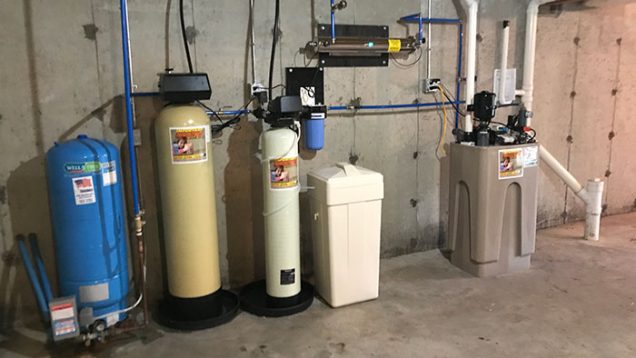Groundwater and surface water are the two main sources of drinking water in the U.S. While both are essential to homes and communities, they differ in how they’re stored, treated, and affected by the environment. Groundwater comes from beneath the earth’s surface, stored in soil and rock formations called aquifers. Surface water, by contrast, includes lakes, rivers, and reservoirs.
If you’re a Connecticut homeowner with a private well, understanding the difference between these sources can help you better manage your water quality, protect your system, and make smarter decisions about testing or filtration.
Groundwater vs. Surface Water: How They Differ in Connecticut
Surface water includes visible sources of freshwater such as lakes, rivers, streams, and wetlands. These sources are directly exposed to the environment, which means they are more likely to be affected by pollution, agricultural runoff, and evaporation. In Connecticut, surface water is primarily used by municipal water systems and is less common for private residential supply.
Groundwater is stored below the earth’s surface in rock layers called aquifers. It forms when rain or melted snow soaks into the soil and slowly moves downward until it reaches saturated rock. This underground water source is naturally filtered through layers of soil and sediment as it travels, which can help reduce the presence of contaminants.
In many areas of Connecticut, private wells are drilled directly into groundwater aquifers. These wells provide water for thousands of homes and are considered a reliable source when properly maintained and tested. While groundwater is often cleaner than surface water, it can still contain minerals, bacteria, or naturally occurring substances like radon that may require treatment.
Is Groundwater or Surface Water Better for Drinking in Connecticut?
Surface water is more vulnerable to contamination because it is exposed to the environment. Pollutants can enter through storm runoff, agricultural activity, wildlife, and industrial waste. Chemicals, bacteria, and debris can accumulate quickly, which is why surface water typically requires advanced treatment before it is considered safe to drink.
Groundwater, although not immune to contamination, benefits from natural filtration as it passes through layers of soil, sand, and rock. This helps remove some pollutants before the water reaches an aquifer. For this reason, groundwater from a private well often requires less treatment than surface water. However, it can still contain naturally occurring substances such as iron, manganese, or radon, especially in certain parts of Connecticut.
No matter the source, regular testing and appropriate filtration are essential to ensure your home’s water is clean and safe. Greco & Haines recommends annual testing for private well owners and offers solutions tailored to groundwater quality across Connecticut.
Why Is Groundwater Often Harder Than Surface Water?
While groundwater typically contains fewer contaminants than surface water, it often has a higher mineral content. This is because water is known as the “universal solvent,” capable of dissolving more substances than any other liquid. As groundwater moves through layers of soil and rock, it picks up minerals like calcium and magnesium. These minerals are what make water “hard.”
Hard water contains a higher concentration of these dissolved minerals, while soft water has fewer. The level of mineral content in your water is what determines whether it’s considered soft, moderately hard, or very hard.
How Is Water Hardness Measured?
Water hardness is measured in two ways:
- Milligrams per liter (mg/L)
According to the U.S. Geological Survey:
- Soft: 0 to 60 mg/L
- Moderately hard: 61 to 120 mg/L
- Hard: 121 to 180 mg/L
- Very hard: Over 180 mg/L
- Grains per gallon (gpg)
Used by the Water Quality Association:
- Soft: 0 to 1.0 gpg
- Slightly hard: 1.1 to 3.5 gpg
- Moderately hard: 3.6 to 7.0 gpg
- Hard: 7.1 to 10.5 gpg
- Extremely hard: Over 10.5 gpg
If your water falls into the hard or very hard category, you may benefit from a water softener or filtration system. Greco & Haines offers solutions designed specifically for Connecticut’s groundwater, which is commonly rich in mineral content.
How to Treat Hard Water in Your Well System
If your groundwater has a high mineral content, a water softener can make a big difference. Hard water may not be dangerous, but it can lead to clogged fixtures, soap that doesn’t lather, and buildup in appliances and pipes. Over time, it can reduce the lifespan of your plumbing and increase maintenance costs.
At Greco & Haines, we offer free water testing to help determine if your private well water is considered hard. Our mineral content analysis can identify the levels of calcium and magnesium in your water, along with testing for other common contaminants found in Connecticut wells.
If treatment is needed, we can install a whole-house water softener system designed to reduce mineral buildup and improve water performance throughout your home. Our multi-stage filtration setups can also address other issues like taste, odor, and sediment. With the right system in place, you can eliminate frustrating hard water problems and enjoy cleaner, softer water from every tap.
Understanding Your Water Is the First Step
Whether your home relies on groundwater or you’re comparing it to surface water systems, knowing what’s in your water is essential. Hardness, contaminants, and water quality can vary widely in Connecticut, especially for private well owners.
With regular testing and the right treatment solutions, you can protect your health, extend the life of your plumbing, and enjoy better water every day. If you’re unsure about the condition of your well water, now is the time to find out.
Call us today to schedule an inspection or emergency service anywhere in Connecticut. If you have questions about your well system or need expert assistance, Greco & Haines is here to help. With a longstanding reputation for quality service across Connecticut, we’re dedicated to keeping your water supply clean, safe, and reliable. Give us a call anytime at 203-735-9308, 203-777-2256, or toll-free from any CT area code at 1-800-922-2958.

